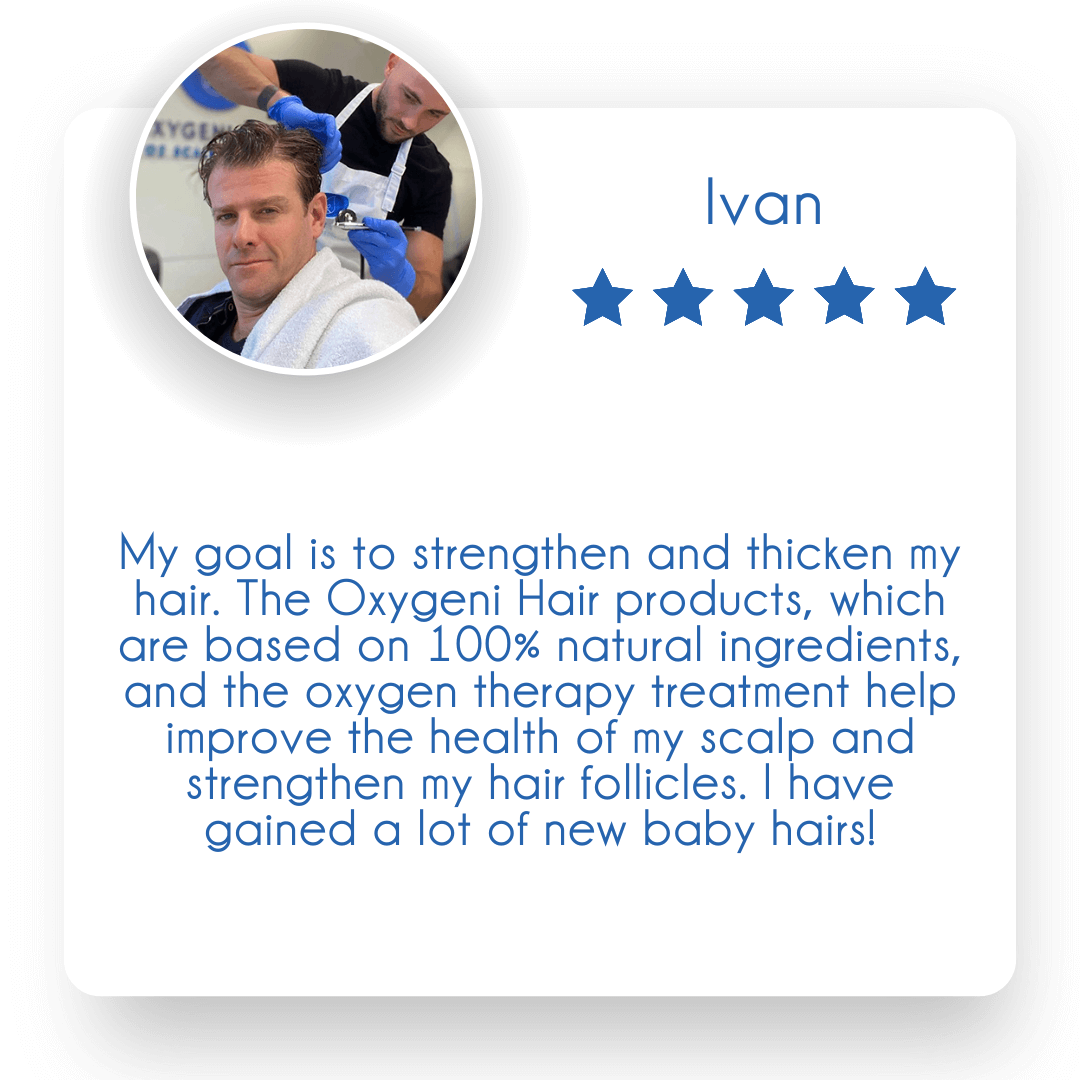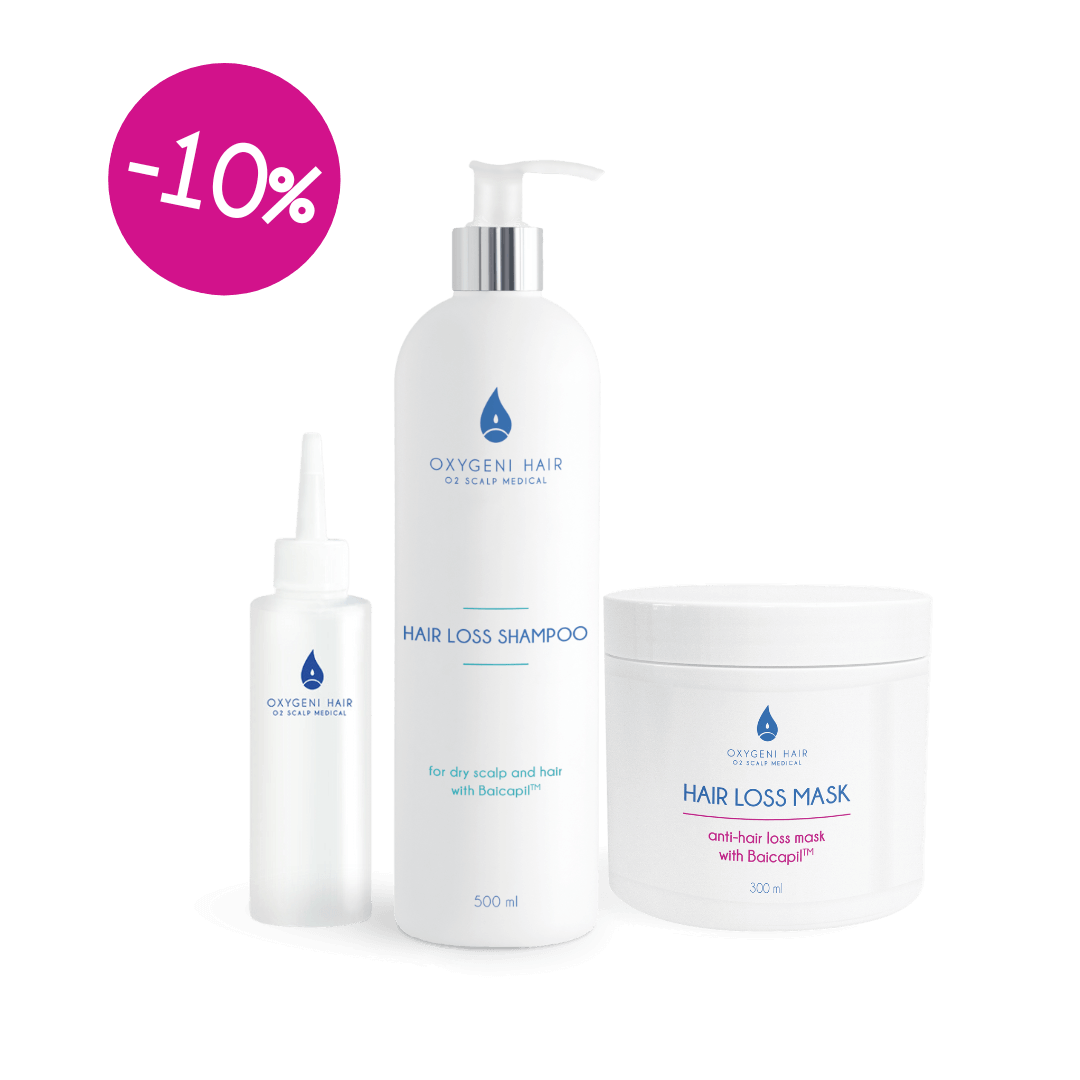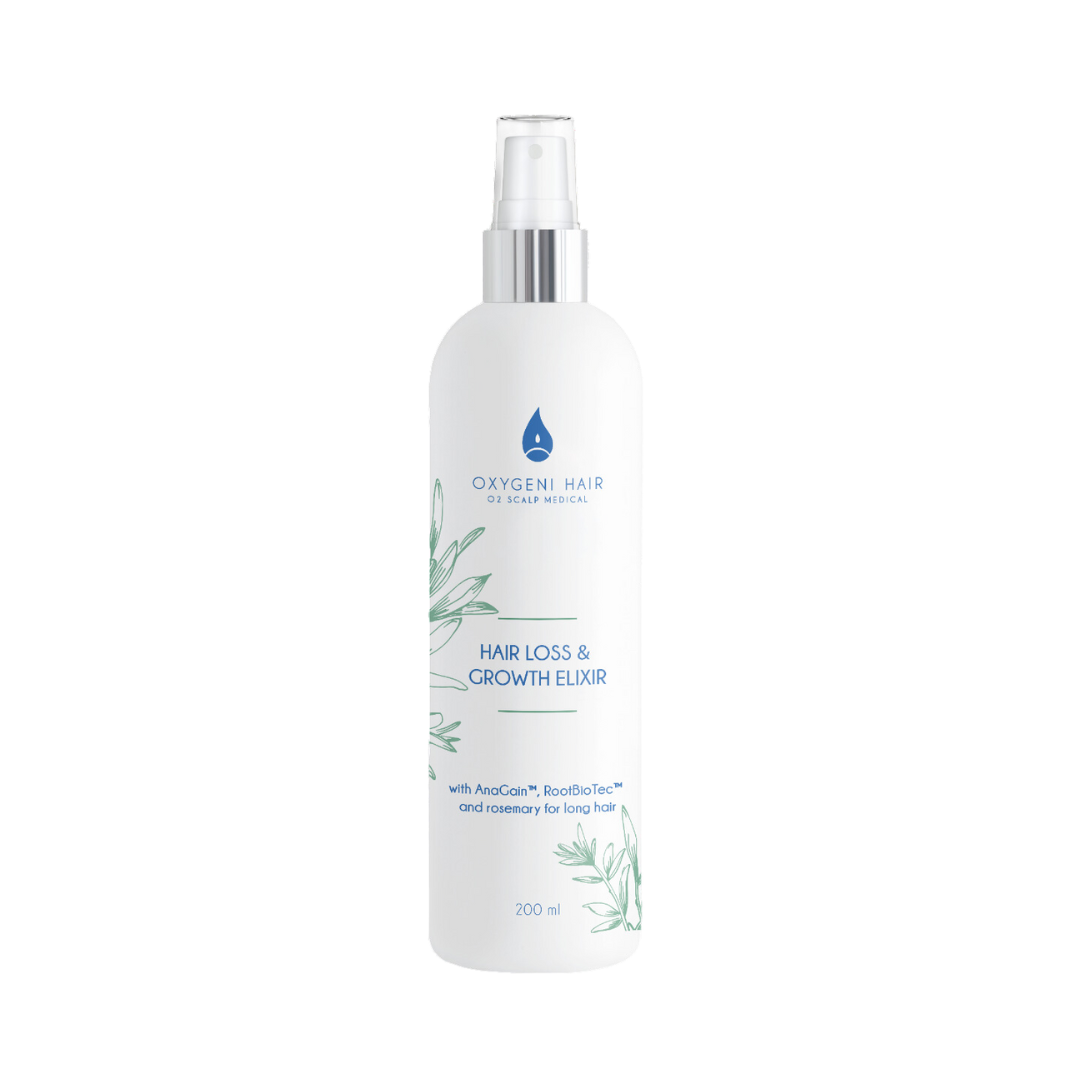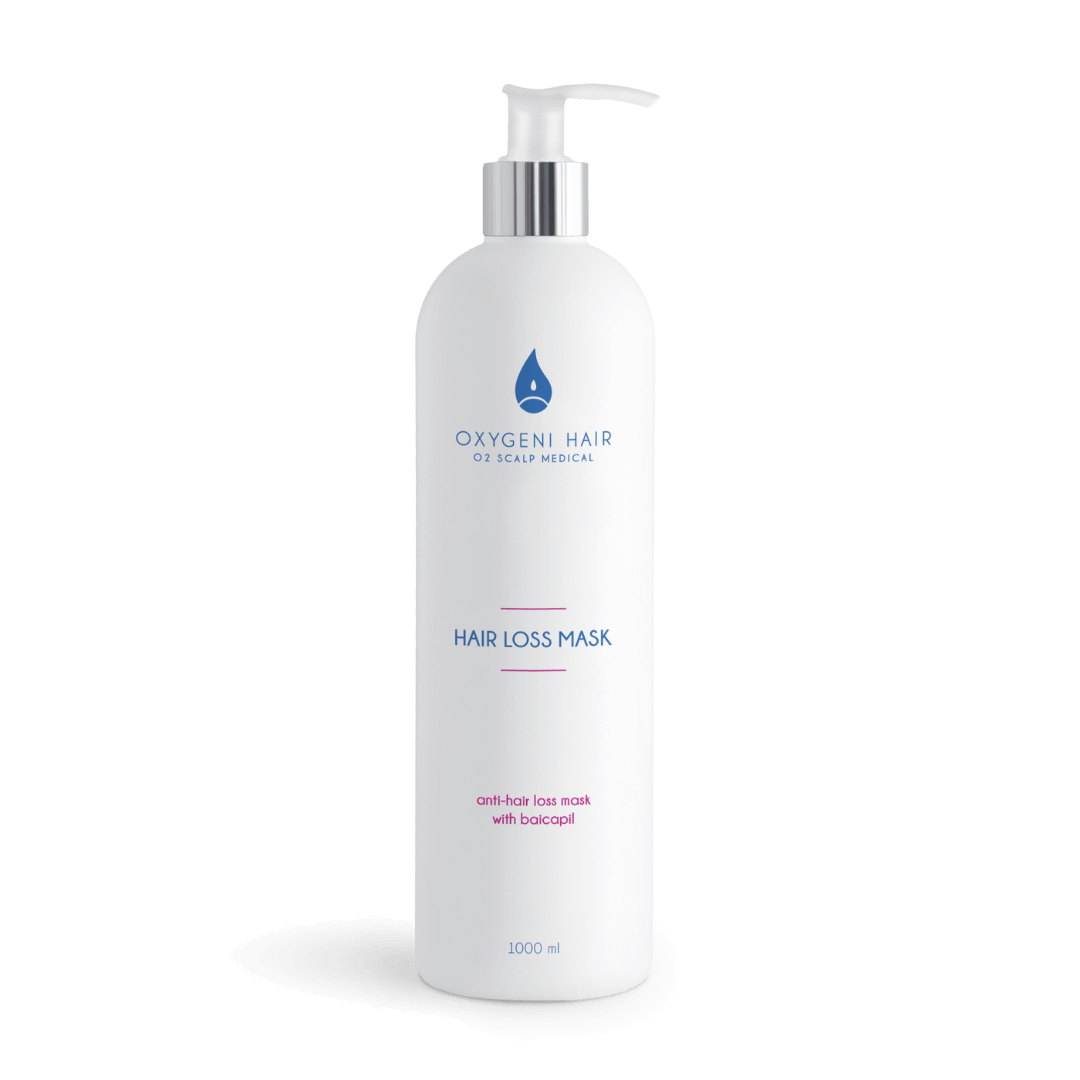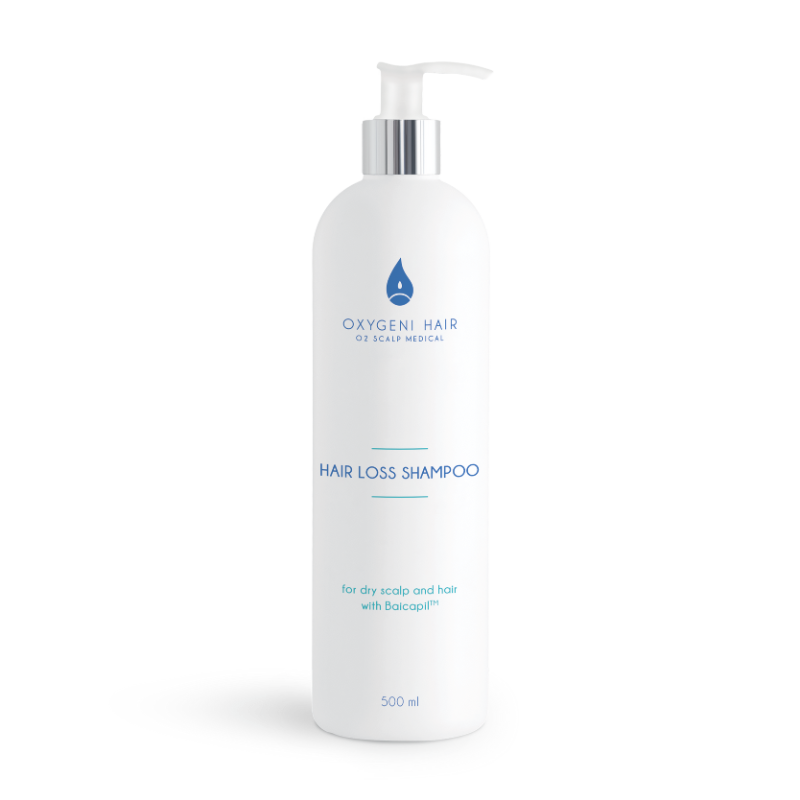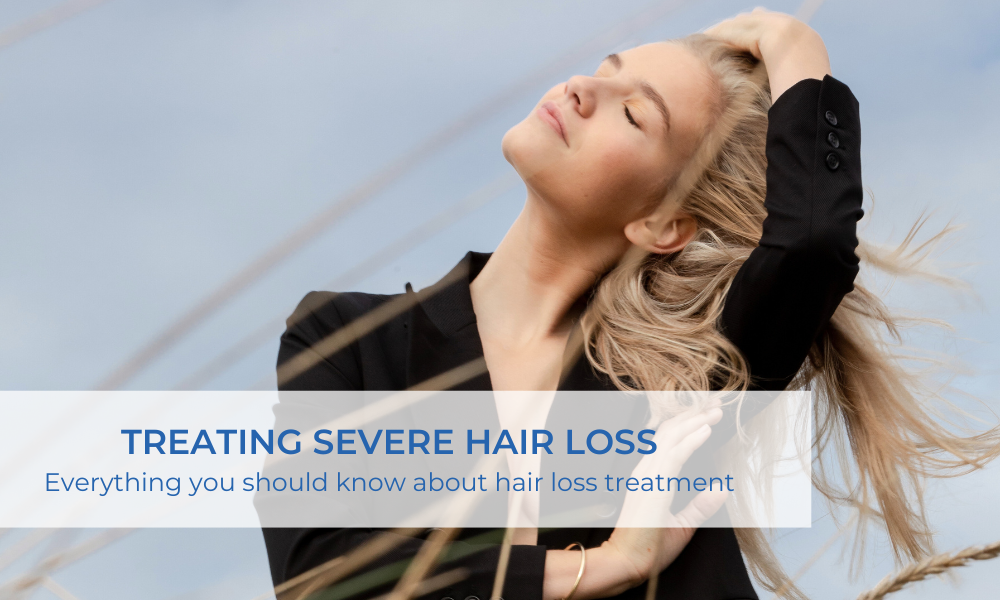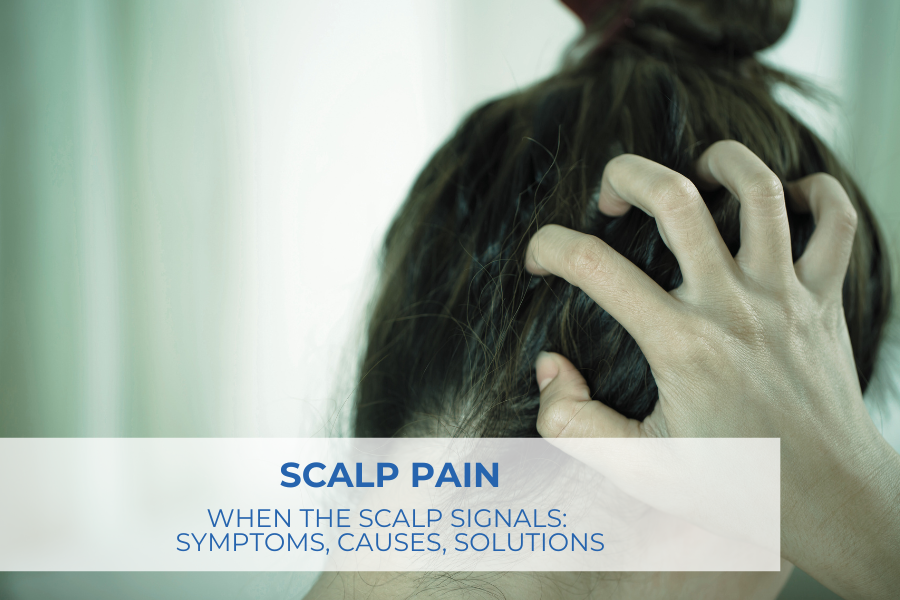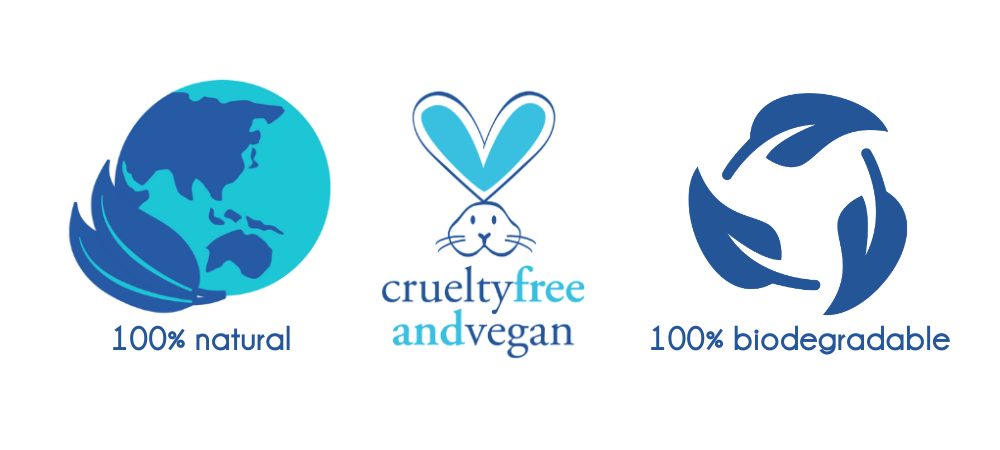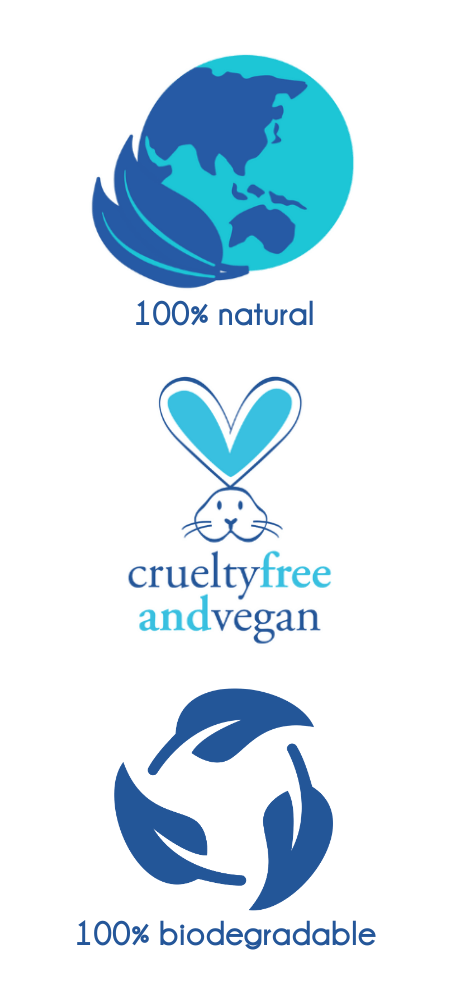All about thyroid-related hair loss and what can you do about it?
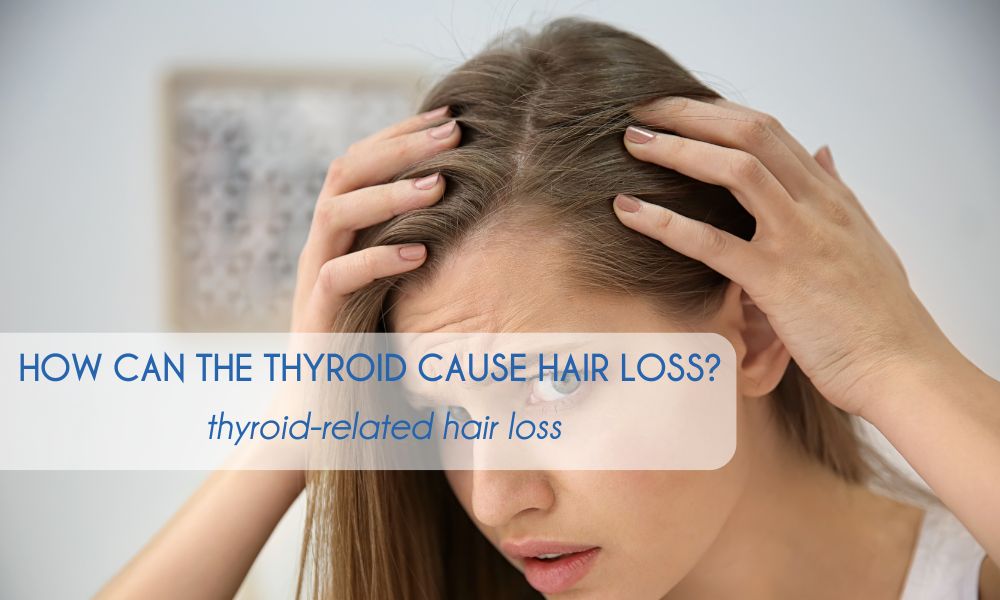
HOW CAN THE THYROID CAUSE HAIR LOSS? – THE DEVELOPMENT AND TREATMENT OF THYROID-RELATED HAIR LOSS
Hair loss affects many people. There are countless possible causes for this unpleasant issue, but if you’ve already considered most of them and the problem persists, it may be worth taking a closer look at your thyroid function. How is this possible, and why is it important to pay attention to your thyroid function? Read the article to find out.
The thyroid is a butterfly-shaped gland located at the front of the neck and is one of the body’s most important glands, influencing numerous functions. It plays a key role in hormone production, metabolism regulation, growth support, immune system balance, energy supply, and cell function.
The thyroid produces two main hormones: T3 (triiodothyronine) and T4 (thyroxine). Their primary function is to regulate energy use and metabolism. Another crucial factor in thyroid function is TSH (thyroid-stimulating hormone), which is produced by the pituitary gland and regulates thyroid activity. TSH stimulates the thyroid to produce more T3 and T4. Changes in TSH levels can indicate hypothyroidism (underactive thyroid) or hyperthyroidism (overactive thyroid).
If the thyroid does not produce enough hormones, metabolism slows down, leading to fatigue, weight gain, and hair loss. On the other hand, excessive hormone production speeds up metabolism, which can cause symptoms like rapid heartbeat, nervousness, and—again—hair loss.
If you suspect a thyroid-related issue, always consult a doctor for a professional diagnosis.
POTENTIAL CAUSES OF THYROID-RELATED HAIR LOSS
The thyroid can experience functional disorders, including hypothyroidism, hyperthyroidism, goiter, and autoimmune diseases.
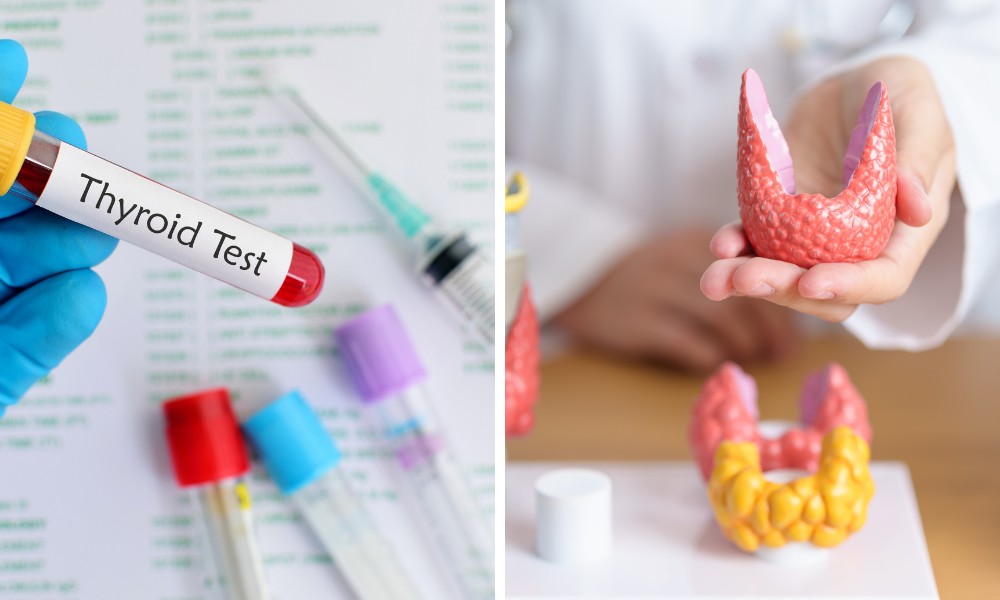
Hyperthyroidism
In hyperthyroidism, our basal metabolism is increased. This means the thyroid produces too many hormones, causing the body to speed up. This manifests in side effects such as rapid heartbeat, weight loss, but also increased appetite, sleep disturbances, hand tremors, nervousness, emotional instability, and hot flashes.
Hypothyroidism
In hypothyroidism, the basal metabolic rate slows down, leading to the opposite of the previously mentioned symptoms. Weight gain, slow heartbeat, and feeling cold are common, along with fatigue, which could also be a sign of depression. This type of imbalance is the most likely cause of hair loss, as a slowed metabolism causes the hair to become undernourished, resulting in thinning hair and eventually hair loss.
Goiter
Goiter refers to the enlargement of the thyroid gland. This phenomenon can occur in both hypothyroidism and hyperthyroidism. It can be recognized as a visible and palpable swelling in the neck, which may even lead to difficulty swallowing and breathing.
Autoimmune diseases
The two autoimmune thyroid diseases are Hashimoto’s thyroiditis, in which the immune system attacks the thyroid, leading to hypothyroidism, and Graves’ disease, where the immune system stimulates the thyroid, causing hyperthyroidism.

Several factors can lead to disturbances in thyroid function. It is important to recognize the problem early and take the appropriate approach to address it.
How does this seemingly complex system lead to thyroid-related hair loss?
In fact, the cause of hair loss can often seem complex, but once we understand the problem, it becomes easier to address. Hair loss can occur in both hypothyroidism and hyperthyroidism, but for different reasons. Hair follicles also have their growth cycle. In a healthy hair follicle, this cycle includes the growth, transitional, and resting phases. During the growth phase, new hair follicles develop, which then enter a resting state during the transitional phase and shed in the resting phase. The hormones produced by the thyroid regulate the functioning of the hair follicles. If too much or too little hormone is produced, it disrupts the hair follicle cycle, causing them to not function properly.
In hypothyroidism, the body’s functions slow down, including the renewal of hair follicles. During this time, the hair follicles enter a “sleep phase,” meaning they no longer produce new hair. As a result, the hair becomes dry and brittle, gradually thinning and starting to fall out in patches. Patchy hair loss is especially noticeable on the crown of the head, as the growth cycle of the hair strands is shorter here, making them more sensitive to hormonal changes. This is the highest point of our body, and nutrients and oxygen find it hardest to reach, especially since circulation slows down during hypothyroidism. Hypothyroidism often causes a dry, flaky scalp, which further damages the health of the hair follicles.
In hyperthyroidism, the excess hormones and the body’s accelerated function speed up the hair follicles’ life cycle. The hair strands pass too quickly through the growth and resting phases, resulting in premature shedding. Due to hyperthyroidism, the hair follicles are unable to regenerate properly, causing them to weaken and thin. This leads to a more uniform hair loss across the entire scalp, known as diffuse hair loss. The condition of the scalp also deteriorates; it may become too oily from increased sebum production or too dry due to excessive moisture loss.
The Importance of Scalp Health
Thyroid problems can also affect the scalp, and this can lead to bigger issues than we might think. The scalp plays an important role in creating a healthy environment for growing hair follicles. If something disrupts this balance, causing the scalp to become either too oily or too dry, it becomes more prone to other problems. Inflammation and scalp sensitivity can occur, often accompanied by irritation and itching. In cases of dryness, itching is typically associated with dandruff-like flaking. Additionally, there is an increased susceptibility to infections, such as fungal infections and seborrheic dermatitis. These conditions can slow down the healing and regeneration process.
How can you tell if its thyroid-related hair loss?
Healthy hair loss typically ranges from 50 to 100 strands per wash, depending on how often you wash your hair and individual factors. However, if more than 150 strands fall out each time, and this is accompanied by other symptoms, it’s worth paying attention to these signs. Thinning, breakage, inflammation, fatigue, sudden weight loss or gain are all examples. Before drawing any conclusions on your own, it’s strongly recommended to consult a doctor. An endocrinologist, dermatologist, trichologist, or gynecologist can all assist.
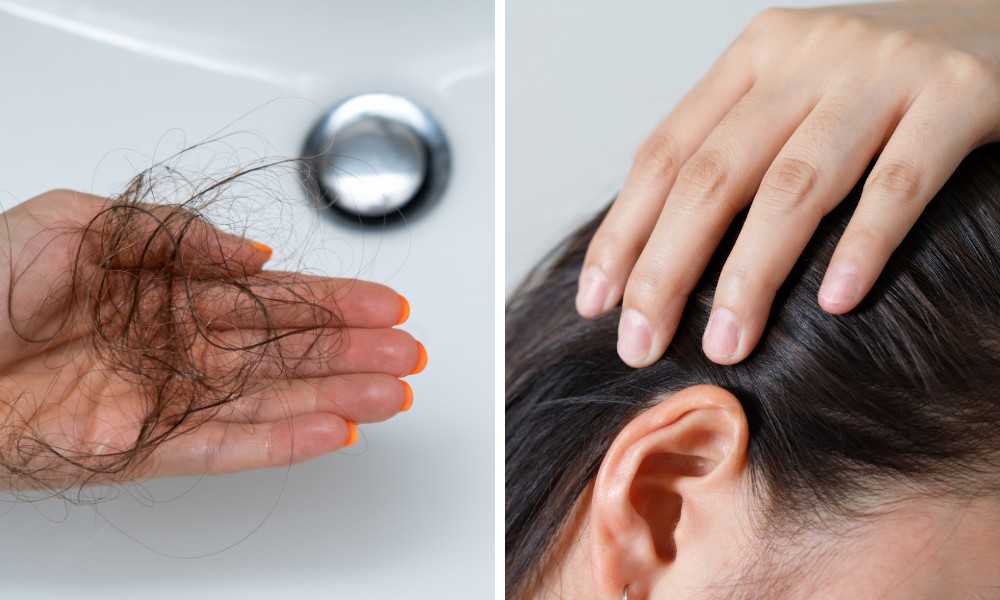
TREATMENT OPTIONS - LIFESTYLE CHANGES FOR THE BETTER
Thyroid disorders can largely be steered in the right direction by making lifestyle changes. This includes adjustments to both our diet and habits.
Hypothyroidism
When managing hypothyroidism, it’s important to boost the body with certain minerals, such as iodine, selenium, and zinc. But why are these necessary?
Zinc contributes to the metabolism of thyroid hormones and helps regulate them. It plays a role in the activation of T3 hormone and strengthens hair follicles and strands. Zinc deficiency can slow down thyroid function, which can worsen hypothyroidism. There are many sources of zinc, including meats, legumes, nuts, seafood like oysters, whole grains, and dairy products. For optimal absorption, it’s important to avoid excessive sugar and alcohol consumption, as these can hinder zinc absorption.
Iodine is crucial to replenish, as it is a key component of both T3 and T4 hormones. They regulate metabolism, cellular functions, and even energy production. Without enough iodine, the thyroid cannot produce enough hormones. For normal hormone production and healthy hair follicles, consume iodized salt, seaweed, and seafood—sushi is an excellent choice. However, if you don’t like the taste of seafood, egg yolks and dairy products are good alternatives. While iodine is essential, it should only be taken in moderation, as too much iodine can disrupt hormone balance. The recommended daily intake for adults is 150 µg, which is roughly equivalent to 6-12 egg yolks or 10-15 pieces of sushi.
Selenium protects the thyroid from oxidative stress. It is a powerful antioxidant and aids in the conversion of thyroid hormones. Selenium supports the strength of hair follicles and promotes hair growth. Foods rich in selenium include meats, seafood, eggs, and grains. Additionally, Brazilian nuts, which are increasingly popular, are packed with selenium. Just 2-3 nuts cover the daily requirement.
Before making any dietary changes, it is important to consult a doctor or medical professional to ensure it is safe and appropriate for your individual needs.
Healthy fats, fiber-rich foods, and a protein-packed diet all contribute to optimal thyroid function. In the case of hypothyroidism, the slowing of metabolism affects the body, making it essential to incorporate regular physical activity, whether it’s a simple walk or light yoga— the key is to stay active.
Hyperthyroidism
The importance of zinc and selenium also plays a role in the treatment of hyperthyroidism. Selenium reduces inflammation in the thyroid, while zinc helps maintain hormonal balance.
It’s also essential to focus on replenishing vitamin D and calcium, as hyperthyroidism accelerates bone breakdown. Vitamin D and calcium help maintain bone strength and the health of hair follicles. Vitamin D is particularly important in managing hair loss. Ensure to consume enough dairy products, almonds, tuna, and broccoli. Protein-rich foods are necessary for supporting weakened muscles, while complex carbohydrates can help reduce hunger with slower-digesting foods. It’s important to avoid foods with high iodine content during hyperthyroidism.
Since the body is accelerated during this time, it manifests in symptoms like rapid heartbeat and stress. Finding an effective stress-reducing method can significantly help manage symptoms. Experiment to see which method works best. Relaxing the nervous system through breathing exercises or meditation can be effective. Slow-moving activities like yoga, walking, or tai chi can help slow down the body. Doing these in nature can enhance the positive effects of movement. Lastly, try to improve your sleep. To ensure it’s restful, avoid using your phone for an hour before bed. Read, drink lavender tea, or listen to soothing music.

Omega-3 is a perfect choice for both conditions. It primarily has anti-inflammatory properties, but it also supports metabolism, reduces fatigue, and aids brain function. It improves dry skin and brittle hair. It prevents muscle loss, supports heart health, and positively impacts bone health. You can find Omega-3 in foods like salmon, mackerel, walnuts, flaxseeds, chia seeds, or in the form of fish oil capsules.
Herbs as Natural Remedies
There are herbs available in supplement form that help balance our hormonal system. It is important to differentiate between issues related to underactive and overactive thyroid. For hypothyroidism, the increasingly popular herb ashwagandha is recommended. It helps with stress management and hormone balance by increasing the production of thyroid hormones. For hyperthyroidism, lemon balm is suggested. Lemon balm reduces the overproduction of thyroid hormones and also has a calming effect.
HOW TO CARE FOR THYROID-RELATED HAIR LOSS?
Hair loss is a common consequence of thyroid disorders. In many cases, proper nutrition is not enough to restore hair to its original state. However, it also matters what products we use to regain our hair’s original thickness. This issue requires specialized products. The basic Oxygeni Hair hair loss product bundle has been designed for this purpose. The bundle contains two products: a shampoo and a mask. Together, these products work to address the problem.
Additionally, for more complex hair loss issues we recommend the Complex Hair Loss bundle.
By using the package twice a week, you can start to notice changes after three months.
SINGLE PRODUCTS:

Hair Loss Shampoo
The Hair Loss Shampoo is suitable for both patchy and diffuse hair loss. Its main active ingredients include maca root extract and BAICAPIL™. BAICAPIL™ is a unique combination of three plant extracts that stimulates hair growth, increases its density, and reduces hair loss. The maca root extract contains various vitamins, including Vitamin D. Additionally, it has anti-inflammatory properties and helps soothe irritated scalps.
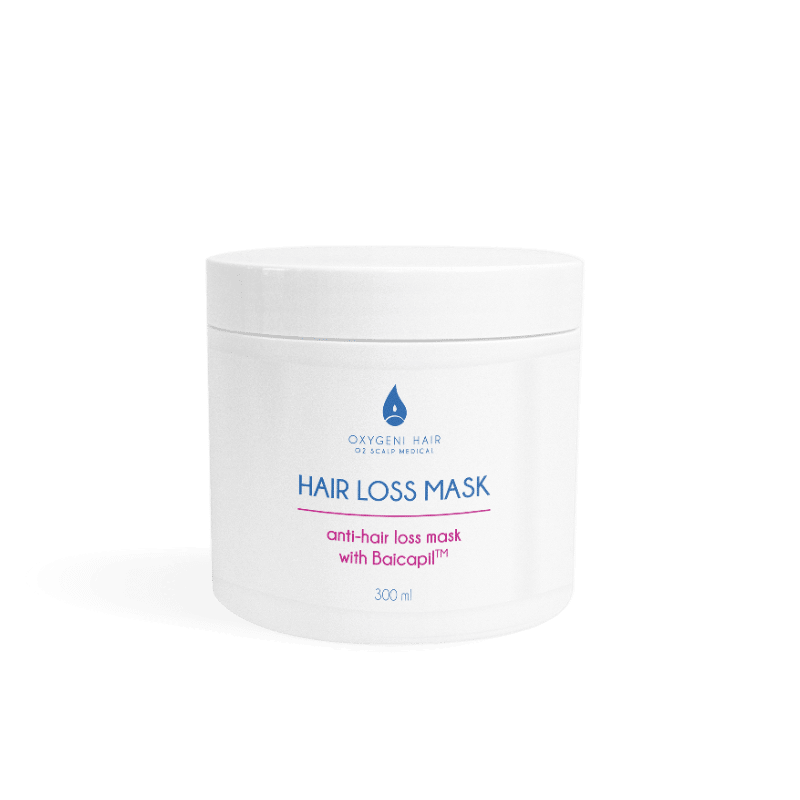
Hair Loss Mask
The Hair Loss Mask is enriched with valuable oils in addition to the shampoo's ingredients. These include argan, jojoba, and rosemary oils, which are proven to strengthen hair follicles and stimulate hair growth. The soothing and nourishing properties are provided by the B5 and panthenol contained in the mask.

+ TIP: Hair Loss & Growth Elixir
The main active ingredient of the Hair Loss & Growth Elixir is the special AnaGain™, which is derived from pea sprouts. It significantly contributes to reducing the extent of hair loss. In addition to pea sprout extract, it also contains basil root hair extract, known as RootBioTec™ HW. This plant has been specifically developed to combat hair loss.
In addition, we can perform various scalp stimulations to improve blood circulation. This could include scalp massage or oxygen therapy. We can carry out the massage ourselves using our hands or the Scalp Brush massager. But how does oxygen therapy help? This hair treatment focuses on boosting the immune system of the scalp. Medical-grade oxygen is delivered to the deeper layers of the scalp, improving blood circulation, strengthening hair follicles, and stimulating hair growth.
WHAT LONG-TERM SOLUTIONS EXIST?
Balancing the function of our thyroid can be achieved with proper nutrition, a balanced lifestyle, and regular medical check-ups. The root cause of the issue can be identified by a knowledgeable specialist, who will then recommend the appropriate treatment. For thyroid diseases, this may include medication or, in some cases, more serious interventions. Therefore, we should not sweep the signs under the rug—if we truly feel something is wrong, we should investigate further.
There are basic things we can do ourselves to start making changes. Often, this is the hardest part—getting started. Incorporating small goals into our daily routine can make it easier to transition to a healthier lifestyle. Set realistic goals at the beginning, ones we know we can achieve. For example, eating two types of vegetables daily or taking a longer walk once a week. If we try to change everything too quickly, there’s a higher chance of giving up early. Let’s remind ourselves that we’re doing this for our health and well-being. Our health is something we often take for granted until something serious happens.
Regular medical check-ups, the right products, and a balanced lifestyle are key to managing thyroid problems and the hair loss that often results from them. Hair loss is a multifaceted issue, but it’s not impossible to restore.
TAKE ON THE FIGHT AGAINST HORMONAL HAIR LOSS!
Hormonal hair loss is not just an aesthetic problem, but a reflection of your body’s internal balance. If you’re noticing thinning hair, increased hair loss, or slower growth, it’s time to specifically support your hair’s health, both inside and out!

COMPLEX ANTI-HAIR LOSS BUNDLE
Hair Loss Prevention Package, recommended for hair strengthening and boosted hair growth, includes Hair Loss Shampoo (500 ml), Hair Loss Mask (300 ml), Pure Aloe Vera (500 ml), H2O Thermal (200 ml), and Vitamin Serum (50 ml).
Writer: Anna Luca Tóth
OXYGEN THERAPY AND OXYGENI HAIR PRODUCT REVIEWS



